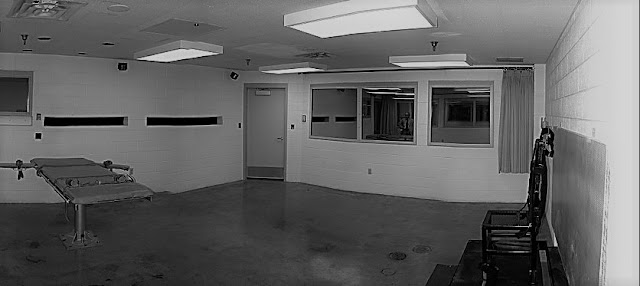Josh Mayfield, November 21, 2022
On Aug. 25, the Missouri Supreme Court set Kevin “KJ” Johnson’s execution date for Nov. 29. Johnson was convicted and sentenced to death when he was 19 years old for the shooting and killing of a police officer. There is more to the story, however, both in regards to Johnson and the racist nature of the death penalty in the United States.
A troubled upbringing
Kevin Johnson grew up in an environment of severe poverty, abuse and neglect. His father was incarcerated when he was a little over a year old, and his mother developed a severe crack addiction, which would continue throughout his whole childhood. He and his older brother Marcus were eventually removed from their mother’s care and sent to live with extended family. They were made to sleep in a converted garage at the ages of 3 and 4 years old respectively, often having to scavenge for food, and even going so far as eating roaches that found their way into the garage. While staying with his aunt, he suffered severe neglect, frequently wearing soiled clothes and only receiving full, decent meals at school.
Johnson also spent many years in various foster homes and group facilities, in which he experienced physical and sexual abuse. He eventually aged out of the child welfare system, one of many children that fall through the cracks of the very scarce resources provided to mentally unwell and troubled youth in this country. A 2016 psychological examination of Johnson concluded that he was “born into a violent, abusive and neglectful environment, with a genetic predisposition to mental illness,” facts which indicate that the Missouri execution would violate international law which prohibits executing individuals with psychosocial disabilities and “limited moral culpability.”
As reported by the Associated Press, on July 5, 2005, police arrived at Johnson’s home in Kirkwood, Missouri, to serve a warrant for his arrest, for allegedly violating probation. As Johnson saw police arrive, he woke his 12-year-old brother “Bam Bam,” who ran over to their grandmother’s house. Bam Bam, who suffered from a congenital heart condition, collapsed upon arriving at the house and began to have a seizure. Johnson testified in court that the police kept his mother from entering the house to aid Bam Bam, as well generally acting apathetically. Although EMS did arrive, it took 18 minutes to get Bam Bam to the hospital, where he tragically passed away shortly after arriving.
This severely traumatizing event, coupled with a life of poverty and abuse, pushed Johnson over the edge. When one of the officers who was at the scene of his brother’s death came back to the neighborhood later to investigate an unrelated incident, Johnson pulled out a gun, shouted, “You killed my brother,” and shot Officer William McEntee, killing him.
Race a ‘decisive factor‘
Johnson received two trials. Missourians for Alternatives to the Death Penalty note that the first trial had a mixed jury of white and Black jurors, which ended up being a hung jury with 10 jurors in favor of second-degree murder and two in favor of first-degree murder. This decision was heavily influenced by Johnson’s attorneys introducing into evidence his life of abuse and neglect and the tragic circumstances of his brother’s death.
A second trial would be required, one in which prosecutor Robert McCulloch sought to guarantee a death sentence. McCulloch himself has a long history of racist prosecutions, with the most high profile being his refusal to prosecute the cop who killed Mike Brown in the case that would set off the Black Lives Matter movement. McCulloch ensured an all-white jury would determine the outcome of Johnson’s second trial, and the attorneys failed to introduce the mitigating evidence that had played a crucial role in the first trial. Johnson was sentenced to death in 2007.
It should surprise no one that in a country with a long history of lynching, mass incarceration of Black and Brown people and general bias in the judicial system, a case like Johnson’s could have the outcome that it did. However, there are some extra facts and statistics which shed light on the supremely racist nature of Johnson’s sentencing. A study published in September 2020 by Frank Baumgartner, a political scientist from the University of North Carolina, found that the likelihood of a death sentence in St. Louis County was 3.5 times greater if the victim was white, as opposed to if the victim was Black. According to Baumgartner, the impact of the race of the victim “persist[ed] after the introduction of controls for aggravating and mitigating factors … meaning that these disparities cannot be explained by legitimate case characteristics.”
The study covered the years 1991 to 2018, roughly tracking the time in which McCulloch was in office as prosecuting attorney for St. Louis County. To put it another way, the percentage of death-eligible cases where the victim was Black ended in death 4% of the time, while the percentage of cases where the victim was white ended in death 14% of the time. Race is most definitely a decisive factor in death sentence cases.
Death penalty: kinder, gentler lynching
Though it may sound overly dramatic to compare the modern day death penalty to lynching, the comparison is more than just a sensationalist analogy. According to a 2015 report by Equal Justice Initiative, 42% of inmates on death row and 34% of those executed since 1976 were Black, despite Black people making up only 13% of the U.S. population. The report points out that starting in the 1920s, southern states began to move away from lynchings, as they were seen to be “bad press.” In place of vigilante violence, these states began to shift towards capital punishment in an attempt to sanitize the process of killing and thus disciplining the Black population. Proving further the link between lynching and modern day state execution, EJI points to the fact that 8 out of every 10 lynchings between 1889 and 1919 took place in the South, and 8 out of every 10 state executions since 1976 have also taken place in the South.
Despite advances in recent years due to the Black Lives Matter movement, African Americans, particularly African American men, are still portrayed as a class of criminals and thus they face massively higher rates of incarceration and state sanctioned executions. The racist U.S. judicial system, which was founded on and continues to thrive on white supremacy, will seemingly never have its fill of the blood of Black people.
Stop the legal lynching of Kevin Johnson
All people of conscience should oppose the execution of Johnson and demand that his death sentence be vacated and clemency granted. Johnson is a clear victim of the broken system of capitalism, which produces poverty and leaves those with mental illness with little recourse, letting them slip through the cracks into abusive and traumatizing situations. No humane system would leave an individual isolated, alienated and broken and then execute him for acting out of that same isolation, alienation and brokenness. The case of Johnson, as well as those of the thousands of other Black men imprisoned and executed by the racist U.S. government, is a damning indictment of capitalism. We desperately need a new system, one which provides for the unique needs of every individual and which focuses on rehabilitation, not cruel punishment.
However, in this very moment, it is imperative that we also fight for immediate clemency for Johnson. At this moment, several progressive organizations have mobilized to fight this impending execution, most notably Missourians for Alternatives to the Death Penalty. MADP began a clemency campaign for Johnson in September, which seeks to raise broad public awareness and mobilize the people of Missouri to oppose this injustice. More information about the clemency campaign can be found at www.madpmo.org, where people can sign the petition to halt Johnson’s execution.
Photo credits: Miss Nibor, Missourians for Alternatives to the Death Penalty/Jeremy Weis
Originally published November 21, 2022 on liberationnews.org.


.png)
















